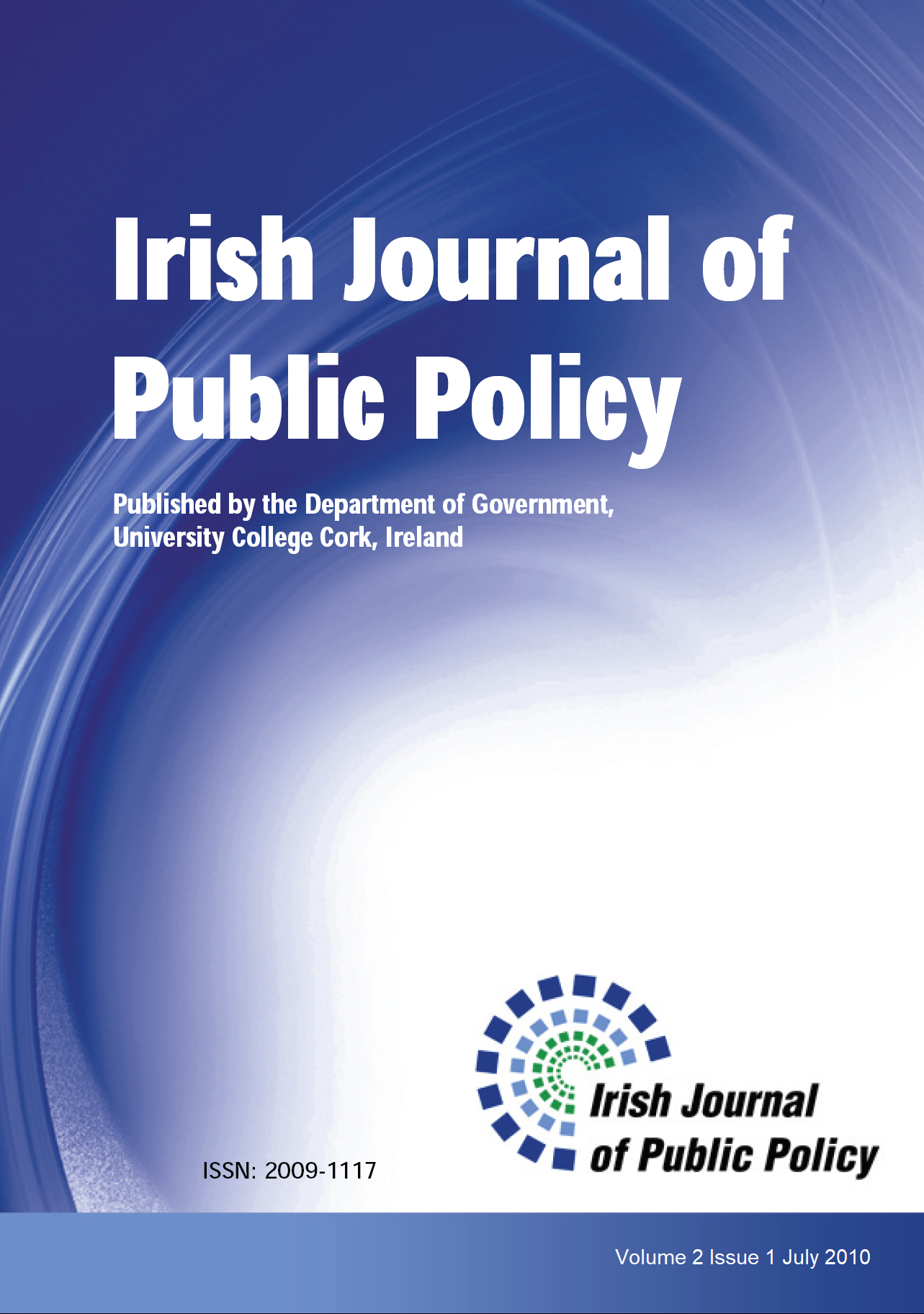What future lies ahead for the Irish welfare state?
DOI:
https://doi.org/10.33178/ijpp.2.1.2Abstract
Beginning by outlining the pre-recession aspirations for an active Irish social policy, the article then examines the recent political economy of social policy and the cumulative impact of the National Asset Management Agency, the Report of the Special Group on Public Service Numbers and Expenditure Programmes (McCarthy, 2009), the Commission on Taxation (Government of Ireland, 2009) and Budget 2010 on unemployment, social expenditure, poverty and inequality. Assuming a Developmental Welfare State is still the aspiration of Irish social policy, it explores three different models of activation; flexicurity, mutual obligations and active inclusion for all. Arguing for a flexicurity model strengthened by incorporating principles from Active Inclusion for All (EAPN, 2008) that promote a less punitive approach to activation; the article ends by considering how to gender the life cycle approach and concludes strong political leadership is required to move in this direction.References
Bell, D. and Blanchflower, D. (2009), ‘What should be done about rising unemployment in the UK’. Available from: http://www.bankofengland.co.uk/publications/speeches/2009/speech379paper.pdf (accessed 30 April 2010).
Boyle, N. (2005), ‘FÁS and Active Labour Market Policy 1985-2004’, Studies in Public Policy, No. 17, Dublin: The Policy Institute, TCD.
Casey, M. (2009), ‘McCarthy is right – but there are social costs’, The Irish Times, 24 August.
CSO (2009), Quarterly National Household Survey Childcare Quarter 4 2007, Dublin: CSO.
Department of Social and Family Affairs (2006), ‘Proposals to Support Lone Parents’, Dublin: Stationery Office.
EAPN (2008), ‘What makes good activation’, Dublin: EAPN Ireland.
EAPN (2009a), ‘“An EU we can trust”: EAPN Proposals on a new EU post-2010 Strategy’, Brussels: EAPN.
EAPN (2009b), ‘Social Welfare: How Ireland compares in Europe’. Available from: http://www.eapn.ie/eapn/wp-content/uploads/2009/10/Social-Welfare-How-Ireland-Compares-in-Europe.pdf (accessed 30 April 2010).
Eurostat (2009), Social protection expenditure in 2006; Eurostat News Release 80/2009 2/6/009. Available from: http://epp.eurostat.ec.europa.eu/cache/ITY_PUBLIC/3-02062009-BP/EN/3-02062009-BP-EN.PDF (accessed 30 April 2010).
FÁS (2009), Irish Labour Market Review 2008, Dublin: FÁS.
Forfás (2010), Profile of employment and unemployment, February 2010, Dublin: Forfás.
Frontline, 2010 [TV] Radio Telefís Éireann 1, Dublin, 13 February.
Government of Ireland (2006), Towards 2016, Dublin: Stationery Office.
Government of Ireland (2009), Report of the Commission on Taxation, Dublin: Stationery Office.
Grubb, D., Singh, S. and Tergeist, P. (2009), Activation Policies in Ireland, OECD Social, Employment and Migration Working Papers No. 75, Paris: OECD.
Hardiman, N. (2009), ‘The impact of the crisis on the Irish political system’ Royal Irish Academy, International politics and the global economic crisis, International Affairs Conference, Royal Irish Academy, Dublin, 5 November.
Hardiman, N., Murphy, P., Burke, O. (2008), ‘The Politics of Economic Adjustment in a Liberal Market Economy: The Social Compensation Hypothesis Revisited’, Irish Political Studies, Vol. 28, no. 3, pp. 599-626.
Higgins M.D., (2009), ‘Towards a vision of citizenship’, The Irish Times, 22 August.
ICTU (2009), Ten Point Plan for National Solidarity, Dublin: ICTU.
Loftus, C. (2010), How The Poor Were Made to Pay: An analysis of the impact of the December 2009 Budget, Dublin: The Poor Can’t Pay. Available from: http://www.thepoorcantpay.ie/how-the-poor-were-made-to-pay (accessed 29 March 2010).
McCarthy, C. (2009), Report of the Special Group on Public Service Numbers and Expenditure Programmes, Dublin: Stationery Office.
Murphy, M. (2008a), ‘Ideas, interests and institutions; explaining Irish social security policy’, Combat Poverty Research Working Paper 08/08, Dublin: Combat Poverty.
Murphy, M. (2008b), ‘Reframing the Irish Activation Debate’, Studies in Public Policy, No 23 Dublin: The Policy Institute, TCD.
Murphy, M. and Kirby, P. (2009), ‘The Cosy Consensus of Irish Policy Making: Identifying its Constitutive Features’, Social Science Research and Policy Making: Bridging the Divide, ISSP Annual Conference, Galway 4 December.
Murphy, M. and Millar, M. (2007), ‘The NESC Developmental Welfare State: Opportunity or Threat?’, Administration, Vol. 55, no. 3, pp. 75-100.
NAPSincl (2007), National Action Plan for Social Inclusion, Dublin: Stationery Office.
NESC (2005), The Developmental Welfare State, Dublin: NESC.
NESC (2006) Strategy Highlights: Challenges for policy and partnership, NESC Strategy 2006: People, Productivity, Purpose, Report No.114, Dublin: Stationery Office
NESC (2009), Ireland’s Five Part Crisis: An Integrated response, Report No 118, Dublin: NESDO.
OECD (2008), Public Sector Reform in Ireland, Paris: OECD.
One Family (2010), ‘One-Parent Family Payment Reforms Minister Hanafin’s kite-flying on lone parents must be grounded’, Press Release 6 February.
O’Toole F. (2009), Ship of Fools, How stupidity and corruption sank the Irish Celtic Tiger, Penguin: Ireland.
Robinson, M. (2009), Michael Collins Oration, Béal na Bláth, Cork, 23 August.
Smith, M. (2009), ‘Analysis Note: Gender Equality and Recession’, prepared for European Commission’s Network of Experts on Employment and Gender Equality Issues. Available from: http://ec.europa.eu/social/main.jsp?catId=748 (accessed 30 April 2010).
Torfing, J. (1999), ‘Workfare with Welfare recent reforms of the Danish Welfare State’, Journal of European Social Policy, Vol. 9, no. 1, pp. 5-28.
Downloads
Published
Issue
Section
License
Copyright (c) 2010 the author(s)

This work is licensed under a Creative Commons Attribution-NonCommercial-NoDerivatives 4.0 International License.



